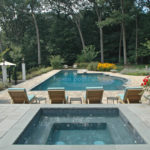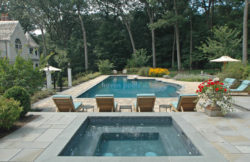
With the brevity of the swimming season here on Long Island, homeowners should think carefully about the type of heater they install with their pool. Although there are a lot of options for how to heat a pool, they are not all created equal. Here’s a quick ranking, from worst to best.
Heat pumps. While perfectly fine for small pools, especially above-ground pools, heat pumps are not practical for the larger, high-end pools that Haven Pools builds and services. And if you have a spa, forget it! It’s unlikely any heat pump will get a spa up to 104 degrees in the spring or fall. The only upside is that they are by far the cheapest to run, although that comes with two critical requirements. The pool must be covered at night and the temperature must be maintained. The pool cannot be heated “on demand” like other options. In addition, they have a higher initial cost.
Oil heaters. These heaters will definitely heat your pool, but there are a lot of drawbacks. For starters the pool industry does not make any oil-fired heaters. The only other alternative is a bulky indirect fired heater with an aluminum cover. They are unsightly and difficult to screen from view. The heater also weighs more than 600 pounds and is expensive to transport. Lastly, there is the inconvenience of oil supply. Tanks need to be refilled by your oil company, which means constantly watching your oil level.
Propane heaters. The only drawback to propane systems is that they need to be refilled from a propane tank. Beyond that, they are a popular choice for those customers for whom the No. 1 choice is not available.
Natural gas. As long as natural gas is available in your neighborhood, this is by far the best system to have to heat your pool. Natural gas continues to be cost effective compared to oil and propane. And let’s not forget that the gas is piped in directly from the utility, so you never need to worry about refilling. The real shining star for gas heaters is that they heat on demand. Raising the pool temperature approximately one degree per hour means that you will always be ready for that last minute party and can heat the pool in almost any weather. The ability to heat on demand also means the heater only needs to run when you are planning on using the pool. This can result in cost savings over a heat pump’s lower average cost to run. You couple that with unlimited supply and you have the ultimate heating for your pool.
Bonus Points: Automatic pool covers. As we already mentioned in a previous article, automatic pool covers can help you heat the pool while it’s not in use during the day, and reduces heat loss at night. This cuts down on overall heating costs and can even extend your swimming season by two months. With this and a gas heater you will be sure to have a long, warm swimming season.

